16 years in 16 words: the sayings that sum up Merkel’s Germany
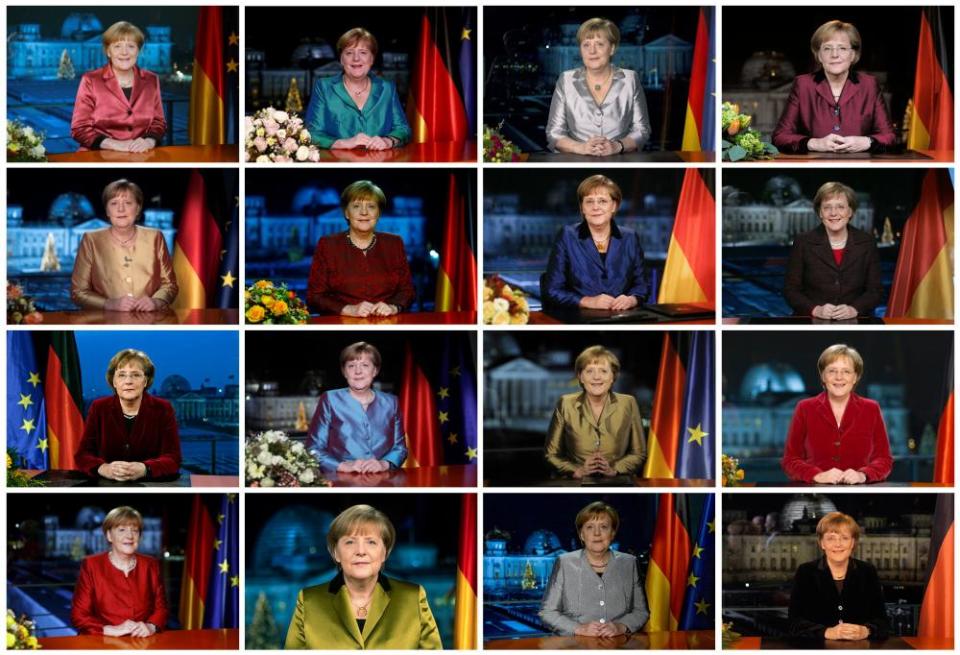
Angela Merkel’s 16-year tenure at the top of German politics will leave lasting legacies in many fields, but the art of political oratory is unlikely to be one of them. When the chancellor addresses the public she is rarely snappy and quotable, and she has even admitted she didn’t believe in governance by speech-making. “The idea that a person can touch other people so much with words that they change their minds is not one I have ever shared, but it’s a beautiful idea nonetheless,” she told Der Spiegel in 2016.
And yet during her decade and a half in power, which is set to end after Sunday’s election, there have been numerous additions to German dictionaries that sum up something about her leadership, be it phrases she used herself or those that others used to describe changes in the country she has led.
Die Merkel-Raute
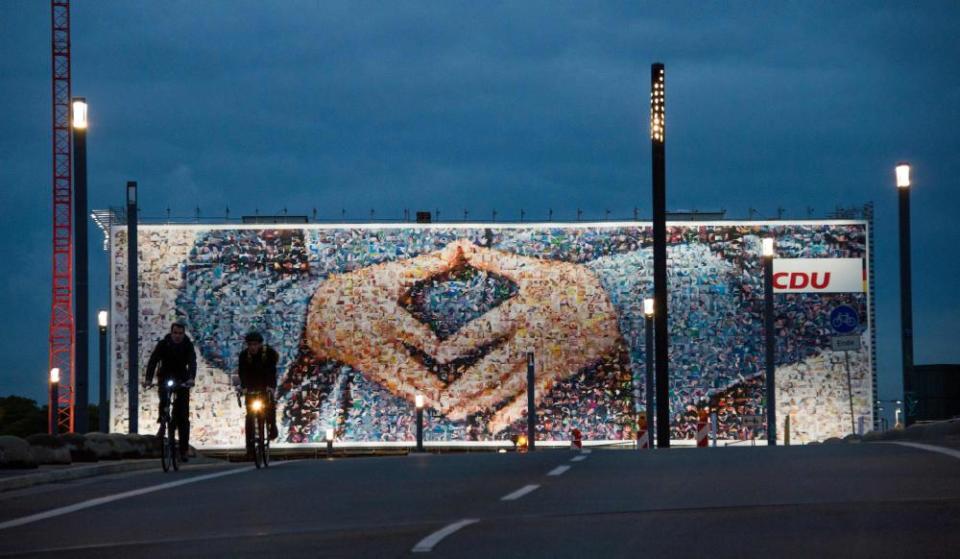
The rhombus shape that Merkel makes with her hands when facing cameras at summits or during visits of state became her trademark gesture more by accident than by design, or so the chancellor claims. “The question was always where should your arms go,” she once told Brigitte magazine. “And that’s how it came about.” Perhaps, she added, the Merkel-Raute also spoke of a “certain love for symmetry”. Before the 2013 election, Merkel’s Christian Democratic Union embraced the rhomboid as the ultimate symbol of her power, renting a large banner outside Berlin’s central station with a mosaic of Merkel’s hands next to the slogan “Germany’s future in good hands”. Olaf Scholz, her would-be successor, was recently photographed for the cover of Süddeutsche Zeitung’s weekend supplement making the gesture, in a cheeky nod to his ambitions.
Ertüchtigen
The word in Merkel’s vocabulary with the strongest whiff of old Prussia, ertüchtigen means to toughen up through physical exercise. The German chancellor has used the term repeatedly, especially through the eurozone crisis, to illustrate what she saw as the “old continent’s” need to modernise through economic reforms in order to be able to compete with China and the US.
Das Public Viewing
A prime example of Denglisch, “public viewing” is an anglicism that snuck into the German language around the summer of 2006 when Germany hosted the football World Cup. It refers to the screening of tournament matches involving the men’s national team in public spaces such as Berlin’s Brandenburg Gate. During the Merkel era, supporting a successful Germany side became fashionable among a wider section of society than it used to be.
Die Muttivation
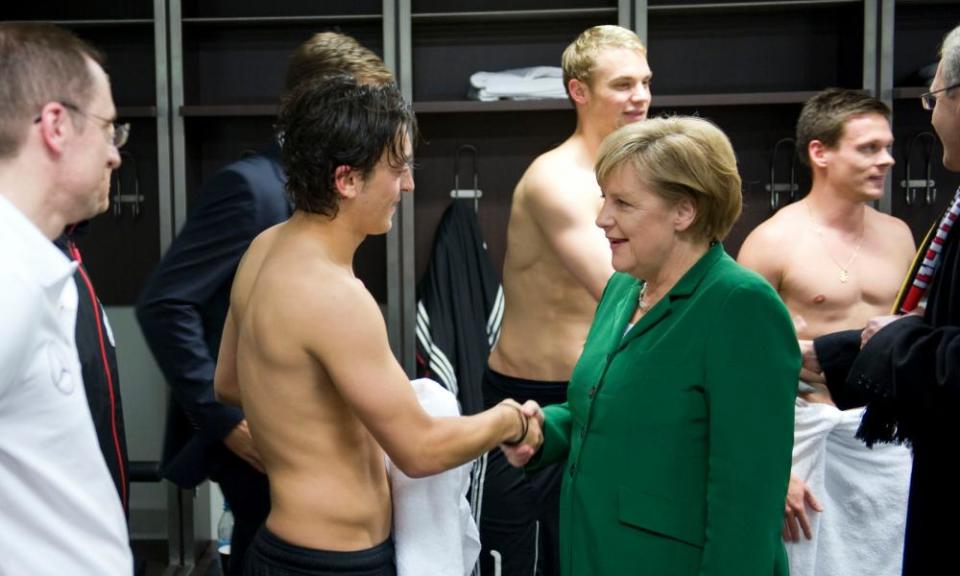
As the national side fought their way to the semi-finals or finals of six international tournaments in a row, supporting Germany at football also became increasingly enjoyed by the chancellor herself. Photos chart the blooming of a love affair: stiffly lining up with a tracksuited national squad in 2006; making her first unannounced visit to the post-match dressing room in 2010; and becoming the team’s unofficial mascot during the victorious 2014 World Cup campaign in Brazil. The wise-cracking striker Lukas Podolski memorably described her visits as a Muttivation, playing on the chancellor’s supposed role as the “mother of the nation”. Podolski earned laughs for his quip, but the term Mutti has been used less frequently in Germany than one may assume from the international coverage of her tenure. When used, it usually comes either with implied speech marks or a dose of macho paternalism. For a more genuine term of endearment, try Angie.
Der Stresstest
Stress-testing is used in medicine to show how the heart performs during physical activity. In the Merkel era, which was accentuated by a series of economic and geopolitical crises, a Stresstest became something that every structure needed to undergo, be it banks, governing coalitions or nuclear power stations. In 2011, when the chancellor decided to phase out all of Germany’s nuclear power stations by 2023, it was voted word of the year by the Association for the German Language.
Energiewende
Die Wende, “the turning point”, is how Germans refer to the events of autumn 1989, when the citizens of the German Democratic Republic rose in peaceful protest against the socialist regime. The term Energiewende refers not to a political system change but the transition to low-carbon or renewable energy sources. Die Wende took place over a few months – the Energiewende predates Merkel’s tenure and is still ongoing. The country has committed itself to becoming greenhouse gas-neutral by the year 2045.
Alternativlos
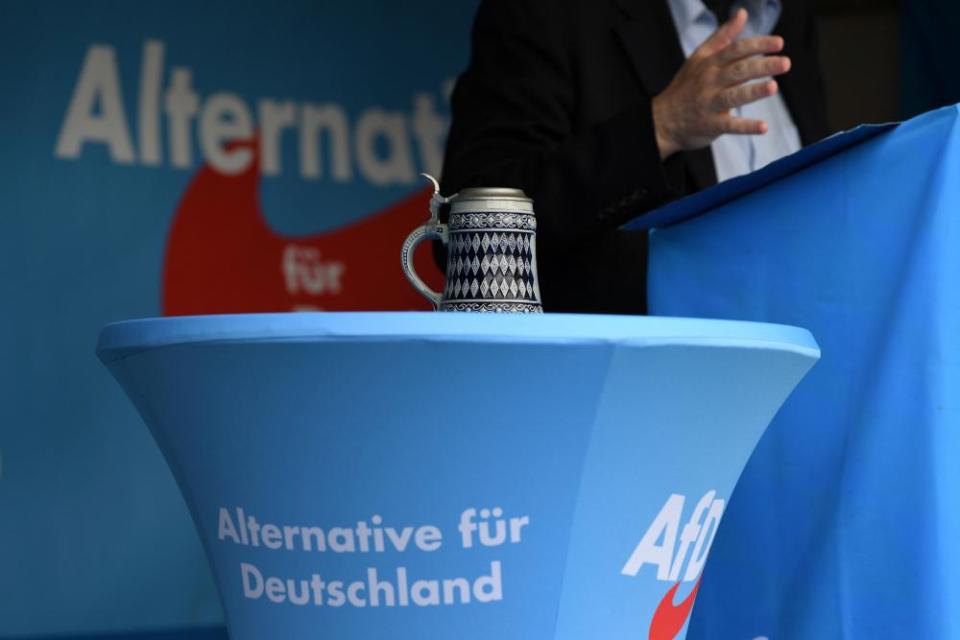
Literally meaning “alternative-less”, alternativlos was Angela Merkel’s own version of a line usually associated with Margaret Thatcher: “There is no alternative.” But if “TINA” was specifically used to close down debates over alternatives to the market economy, Merkel’s government declared all type of policy decisions alternativlos: banking bailouts in response to the global financial crisis, military missions in Afghanistan, reducing the national debt. Her use of the phrase also inspired the naming of the first party to the right of her CDU to make it into the Bundestag: Alternative für Deutschland.
Die Döner-Morde

Between 2000 and 2007 a neo-Nazi terror group called the National Socialist Underground murdered 10 people in targeted attacks throughout Germany, most of them small business owners of Turkish or Kurdish origin. With police in the dark about the racist motivation behind the murders, German media tied them to gang warfare among the country’s German-Turkish population. Because İsmail Yaşar, the sixth victim, had owned a kebab shop, a Nuremberg newspaper referred to the killings as the Döner-Morde, or kebab murders; other newspapers wrote of a “kebab murderer” or “kebab killer”. The term lives on in ignominy for the way it dehumanised murdered people as mere meat, and as a shorthand for the blind eye the country turned to the activities of the far right. Two of the NSU’s members were found dead in an apparent murder-suicide after a failed bank robbery on 4 November 2011, finally shedding light on activity that had gone undetected for over a decade.
Das Neuland

“Virgin territory” is how Merkel described the world wide web in 2013: “Das Internet ist für uns alle Neuland” – “the internet is virgin territory for all of us”. People scoffed at the phrase, as if the chancellor was finally waking up to digitalisation some 30 years after the Transfer Control Protocol/Internetwork Protocol (TCP/IP) allowed computers on different networks to talk to each other. The phrase stuck also because Merkel’s governments never looked as if they pursued a coordinated strategy to heave Germany’s public administrative systems on to digital tracks. But context is important: Merkel’s spoke her line at a press conference after meeting the then US president, Barack Obama, to discuss the NSA’s bugging of her phone. Her wider point was that even though internet usage in 2013 was widespread, the legal ramifications of mass surveillance and cyber-espionage were still uncharted territory.
Die Willkommenskultur
In the summer of 2015, when Merkel declined to close Germany’s borders to more than 1 million migrants and refugees who had mostly been uprooted by the war in Syria, the term “welcoming culture” was used to describe the upbeat attitude many Germans displayed towards the newcomers. About 55% of Germany’s population over the age of 16 volunteered to help in some form, a study later found, from giving people temporary accommodation in their homes to teaching German.
Wir schaffen das
“Germany is a strong country,” Merkel told the media at a press conference in central Berlin on 31 August 2015, trying to address concerns about the steeply rising number of people applying for asylum in Germany that summer. “The motive with which we approach these matters must be: we have already managed so much, we’ll manage this.” Wir schaffen das became Merkel’s version of Obama’s “yes we can”: a casual, throwaway line that nonetheless spoke of her determination to take on the logistical and political challenges facing her at the time. As with alternativlos, the AfD tried to use Merkel’s language against her: “Wir wollen das gar nicht schaffen,” the AfD politician Alexander Gauland proclaimed at a party rally in October 2015 – “we really don’t want to manage this”.
Die Lügenpresse
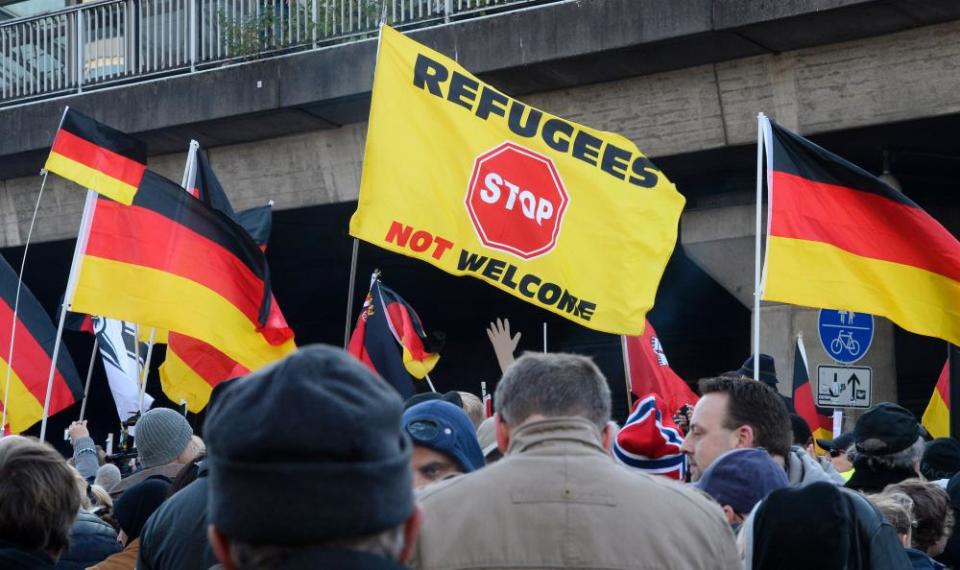
Dating back to the 19th century, the phrase “liar’s press” entered wider usage in Germany in the first world war when it was used by German intellectuals railing against foreign newspapers’ coverage of the Kaiser’s colonial rule. In the 1930s the Nazis referred to Hitler’s critics as Lügenpresse apparatus. Eighty years later, the phrase washed back into Germany on the wave of a backlash against Merkel’s refugee policy among some parts of the population, chanted at anti-government demonstrations organised by the Pegida movement.
Der Putinversteher
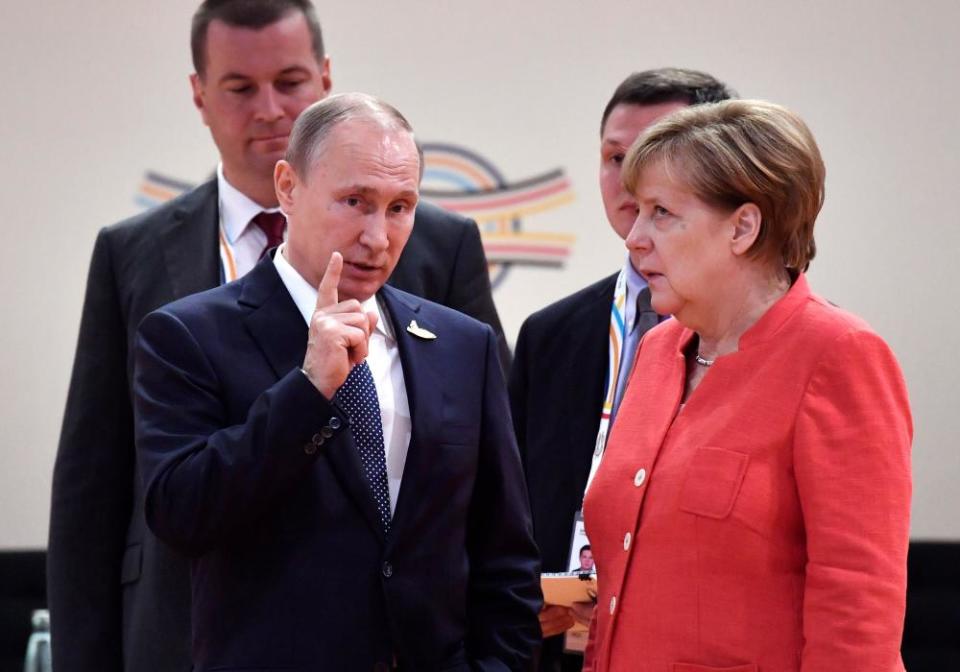
Merkel was Germany’s first Putinversteher, though only in the literal sense of “one who understands Putin”: having once been selected as East Germany’s third best student of the Russian language in her teens, she was able to exchange pleasantries and not-so-pleasantries with the Russian leader without a translator. In the more figurative sense, Putinversteher came to mean those such as her predecessor Gerhard Schröder who voiced sympathy with Russia’s position over the annexation of the Crimean peninsula and warned against European sanctions. For economic and geopolitical reasons, Germany has been far more equivocal about Putin’s Russia than Britain.
Die Asymmetrische Demobilisierung
Used by the pollster Matthias Jung to describe the causes behind Merkel’s 2009 election success, “asymmetric demobilisation” describes an election strategy that functions on the basis of avoiding making statements on controversial topics, with the aim of demotivating political opponents or removing their firing power to the extent that they avoid tackling an issue or going to the polls. The term has since been used in relation to Merkel’s style of governance even in non-election periods, though Jung himself recently said the strategy was effectively rendered ineffective with the 2017 elections, in which Alternative für Deutschland entered parliament on an explicit anti-Merkel ticket.
Die Öffnungsorgien

The debate around “opening-up orgies” after Germany’s second lockdown of the Covid-19 pandemic revealed a dividing line within Merkel’s party. The saying was coined in February 2021 by Winfried Kretschmann, the Green state premier of Baden-Württemberg. The chancellor was among those politicians, like Kretschmann, who warned that reopening shops, restaurants or bars too soon could backfire. Many Christian Democrats, including her designated successor, Armin Laschet, advocated a strategy of “living with the virus” and pushed to exit lockdown at the earliest opportunity.
Die Schwerkraft

Merkel’s training as a quantum chemist has frequently shaped her political vocabulary. Defending her pandemic management in front of Germany’s parliament in December 2020, the chancellor spoke of the danger of not sticking to concrete facts. “I decided to study physics in the GDR […] because I was quite sure that you can suspend a lot of things but not gravity, not the speed of light, even in the GDR,” she said. “Two and two makes four, even under [Erich] Honecker [the former East German leader].”
Asked by the journalist Moritz von Uslar which physical law also applied to politics, Merkel proposed the law of Schwerkraft, or gravity: “Without mass, no depth.”

 Yahoo Finance
Yahoo Finance 